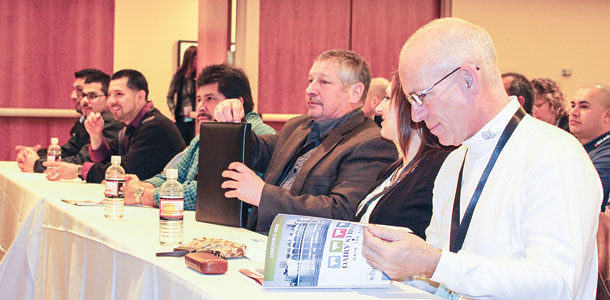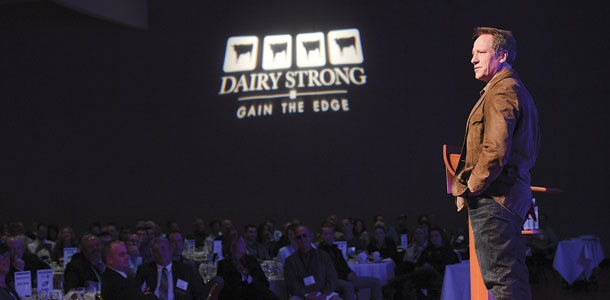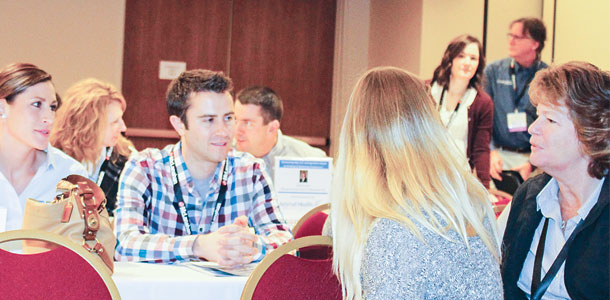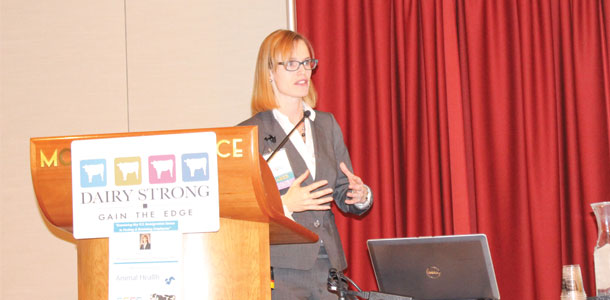Attendees of the Dairy Strong conference, Jan. 13-15, in Madison, Wisconsin, enjoyed a rock-star lineup of speakers including Mike Rowe, host of the hit show Dirty Jobs. Rowe wowed the crowd with his keynote about how he had to change his own way of doing things to discover his true path in life.
When asked how dairy farmers can start to gain appreciation and trust from the American public, Rowe’s comments were lockstep with the vision for the Dairy Strong conference.
“It’s time to start talking to people who are addicted to chewing and swallowing,” Rowe said. “You are a victim of your own efficiency and success.”
The dairy economy, opportunities for market growth and immigration were distinct themes of the three-day event coordinated by the Dairy Business Association and its partners.
The dairy economy
With milk futures projected to be between $14 and $15 per hundredweight (cwt) for the first months of 2015, the dairy industry economic outlook was top-of-mind for attendees. However, it’s not quite 2009 all over again.
“We are in a different moment, but it won’t stay this way,” said Bruce Scherr, former chairman and CEO of Informa Economics Inc., a leading agricultural market research and consulting firm.
“Right now we have excesses and that’s why we have low [corn and milk] prices,” Scherr added.
Demand was high for milk and dairy products in both the international and domestic markets, and U.S. dairy farmers responded with an increased supply. As a result, the market is currently flooded and prices are at a steady decline.
However, Scherr believes that the best is yet to come. “The best years for dairy are in front of you,” he said. “There is a growing number of people with expanding incomes, and we will see dairy prices increase.”
The future of dairy growth
Continuing the economic conversation, the future of dairy growth both from a farm and processor standpoint was examined in a panel discussion moderated by John Umhoefer from the Wisconsin Cheese Makers Association.
Panelists included Mark Stephenson from the University of Wisconsin, Jay Waldvogel from Dairy Farmers of America and Mike Brown from Glanbia Foods Inc.
When asked about declining dairy prices, the panel agreed that the linkage to the global market is the reason for the price drop – and that won’t change any time soon.
“There have been years where it makes sense to sell cows and cash crop, and there are years like 2014, where it made sense to run $3 corn through cows to make $20 (cwt) milk,” Waldvogel said.
Since farmers don’t have that level of flexibility in the ag industry from year to year, periods of high prices are often followed by “lags,” according to Waldvogel.
The panelists agreed that long term, international trade will grow the U.S. dairy industry and urged dairy farmers not to worry too much about the slowing dairy economy in the first half of 2015.
Immigration
One cannot talk about the employment and labor issues in the dairy industry without also talking about immigration. According to Kelly Fortier, attorney and partner with Michael Best & Friedrich, upwards of 50 percent of immigrant workers in U.S. agriculture lack legal authorization.
In states like Wisconsin, an estimated 40 percent of immigrant workers on dairy farms lack legal status.
“[Immigration] audits have increased. The government will never tell you what causes them to show up,” Fortier said.
For employers, it’s important to have a strong Form I-9 program and to be aware of document fraud. Some people think that more is better when it comes to forms of identification, but Fortier encourages employers to submit what is required, rather than going above and beyond.
In November, President Obama issued a series of executive actions.
So what should farmers do now? “Right now, you don’t need to do anything differently; just make sure you have a strong I-9 protocol,” Fortier said. “If an employee gives you an update for their I-9, you can still keep them.”
Not your average dairy meeting
This was the first year for the Dairy Strong conference, and organizers plan to make it an annual event. The conference theme, “Gain the Edge,” was totally appropriate given the line-up of speakers and events.
In addition to economic and immigration issues, technology, efficiency and crisis management were focal points of the event. To learn more about Dairy Strong and the Dairy Business Association of Wisconsin, visit the website.PD
Maria F. McGinnis is a freelance writer based in Sun Prairie, Wisconsin.
PHOTOS
PHOTO 1: Owners and managers as well as dairy industry professionals attended the Dairy Strong conference in Madison, Wisconsin, this past January.
PHOTO 2: “We need to get this country reconnected with hard work,” said Mike Rowe, host of the hit TV show Dirty Jobs and the new series on CNN, Somebody’s Gotta Do It.
PHOTO 3: Jacob and Lauren Brey of Sturgeon Bay, Wisconsin, network with fellow dairy professionals before one of the sessions at the Dairy Strong conference.
PHOTO 4: Attorney and speaker Kelly Fortier said during one of the conference’s breakout sessions that immigration reform isn’t going to happen until there is bi-partisan buy-in. Photos courtesy of Maria F. McGinnis and Patrick Flood for DBA.







